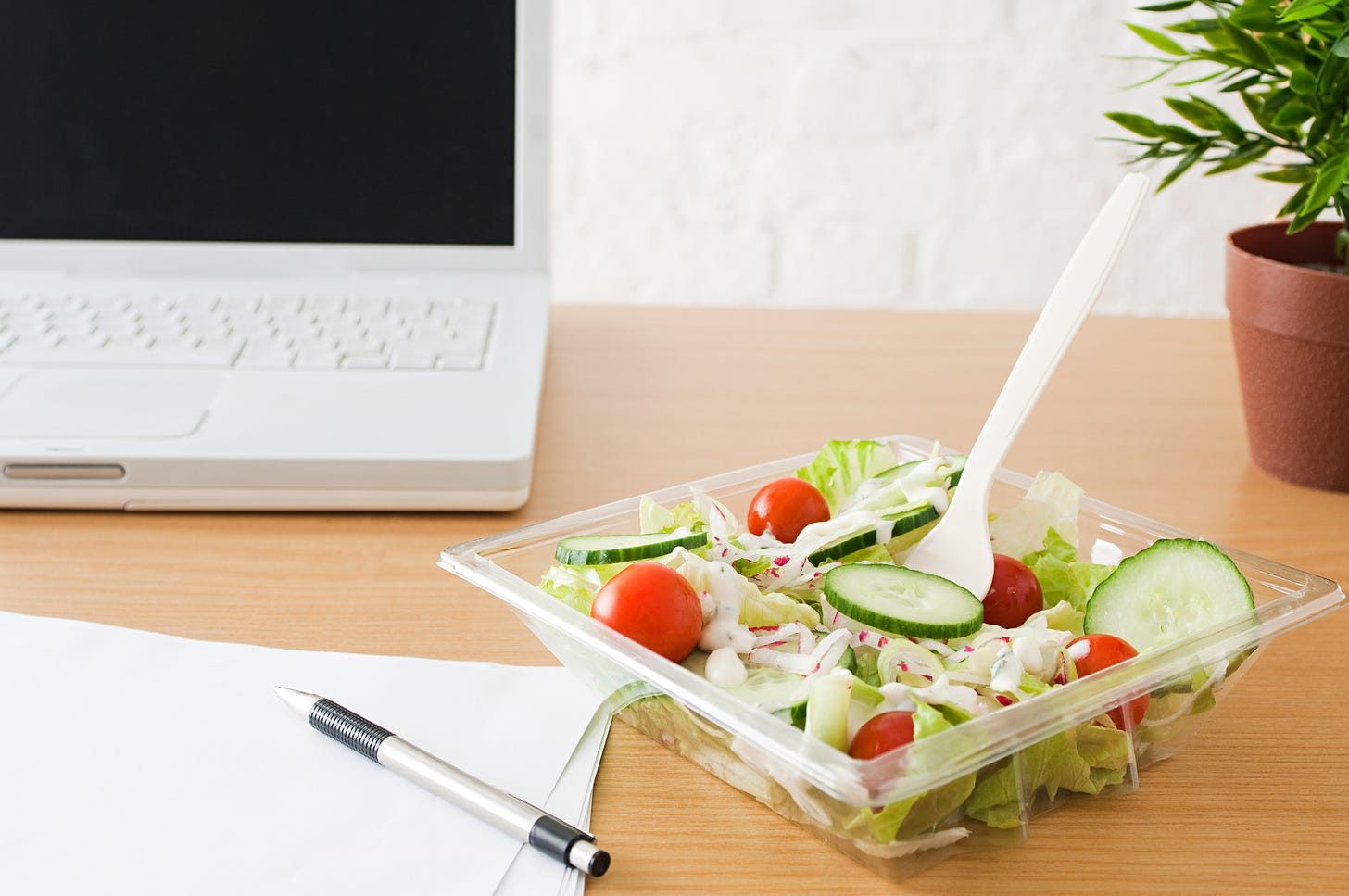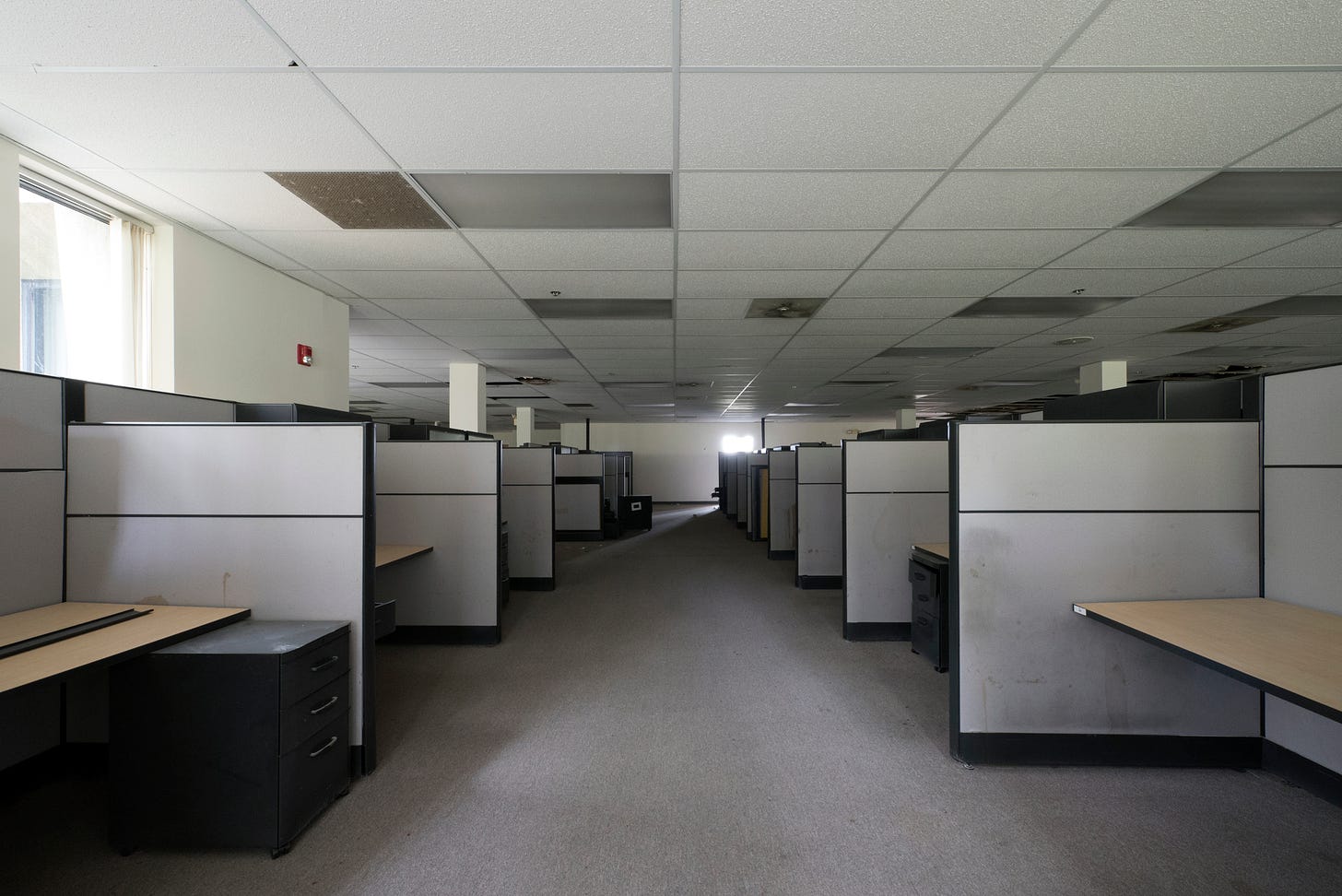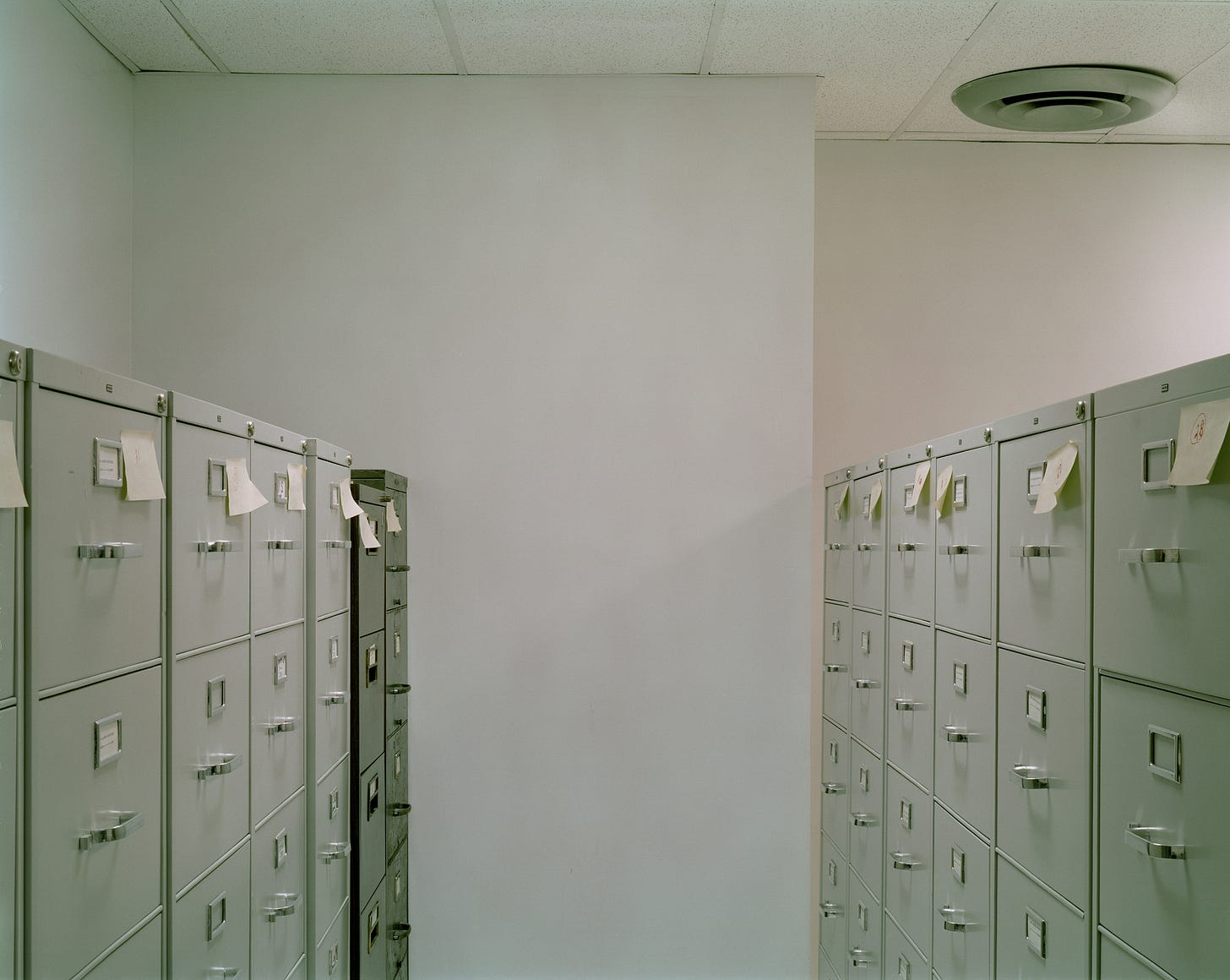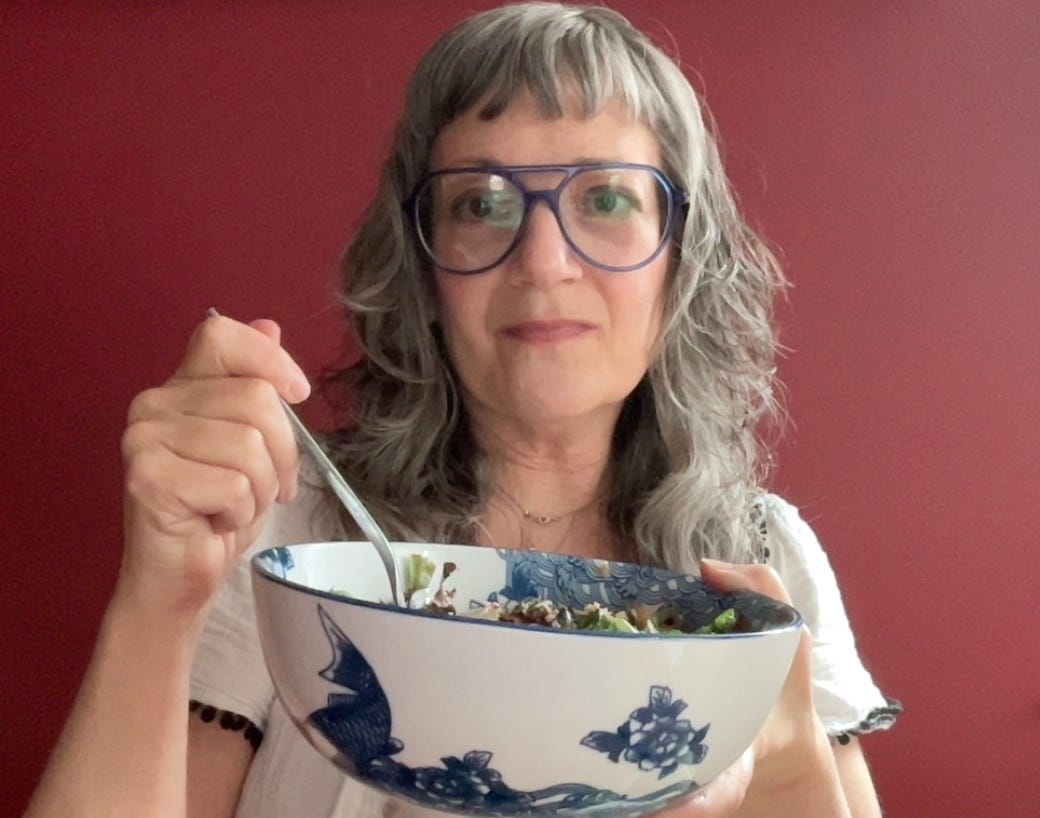Readers,
Maybe some of you still work in offices daily, or on a regular basis. But I’m guessing that among those of you who aren’t retired, many are now working remotely—if not full-time, then part of the time, in a “hybrid” situation.
Although some companies are trying to get their employees to come back to their physical work spaces, to a large degree, we’re seeing the end of full-time worker presence in offices. It’s made me think about both the good times and bad times I had in corporate spaces, and to want to hear about yours.
Remote work was a trend already in motion, “the future of work,” even before a deadly virus fast-forwarded us to the end of office life as we knew it. Eliminating (or reducing) commuting was obviously a good choice, environmentally speaking, and also in terms of saving personal time. (Although it’s made some people miss zoning out to podcasts and novels on mass transit for an hour each way between home and work.)
Also, by not paying for offices and furniture and equipment, companies can save a lot of money that they can then at least theoretically pass along to their workers—although I doubt that’s happened in our late-stage capitalistic dystopia. And apparently this trend has been wreaking havoc on the commercial real estate market, which is said to *seriously threaten the economy. (*I have absolutely no idea how the economy works.)
Long before the advent of Covid, from 2015 to 2020 I worked for a company that was “distributed,” meaning it had no office, and was staffed by people working from home, or from coworking spaces, around the globe. From our various time zones, my colleagues and I “met” daily on an instant messaging app called Slack, and weekly for editorial meetings over Zoom.
Slack functioned as our virtual office, or newsroom, and it totally worked, proving that you don’t need a brick and mortar office in order to work collaboratively. That said, I missed working in the physical company of others, and having a reason to dress in something other than pajamas. So, in 2017, I started a co-working space for writers in my area, from which I mainly performed my day job.
One night in 2017, a Google document served as our newsroom. An author in London, a copyeditor in the Bay Area, a fact-checker in New Jersey, and I—in my kitchen in Kingston, New York—all collaborated in “suggesting mode” in that Google doc until 3am Eastern. Together, in three different time zones, we raced toward our deadline on an article that for some reason absolutely had to run the next morning. It was wild, and kind of thrilling, actually. None of us were in the same room, or ever spoke on the phone. We were on different coasts and continents, but for hours and hours we were all singularly focused on getting that article out, collaborating virtually.
Before that I worked in an assortment of brick and mortar newsrooms—my favorite kind of office, the kind for which Maureen Dowd recently wrote a requiem in the New York Times. From the time I was a college intern at Newsday in the summer of 1986, where they threw me in the deep end as a reporter on the arts desk from the first day, I found newsrooms exhilarating to work in—not only because I got to work side-by-side with illustrious journalists like Sydney Schanberg and Dith Pran.
I loved the hum of nonstop typing throughout the place. Loved the collaboration between reporter and editor and art department. Was fascinated by the pneumatic tube system through which materials were instantly transported from one department to the next.
Ditto the “morgue,” an area where back issues of the newspaper and old photographs were stored, before such things were catalogued digitally. If you were referencing an article or photograph from the paper’s archive, you’d walk to the morgue and fill out a request form. Later, someone from the mail room would cart those materials over to your desk for you to include in whatever you were writing.

Over many years—from Newsday to Women’s Wear Daily/W to MTV News to the New York Daily News to Time Out New York to Billboard the New York Times, and elsewhere—I got to feel a part of something that felt important: reporting the news. Even arts and fashion news felt crucially important. We were documenting culture and its shifts. There was a sense of urgency and cameradery to our work that made it easy to overlook the tedious and boring aspects of office life—the sad desk salads, the hours returning phone calls and later, responding to emails, filling out time sheets, attending boring meetings. (There were so many unnecessary meetings.)
When there was no journalism work available, I worked in other kinds of offices. In college I processed claims at Blue Cross/Blue Shield. Now and then I worked as an office temp, at law firms and corporations. I spent some time writing copy at various ad agencies.
For seven weeks in 2011 I was a “plaintiff biographer” at a personal injury law firm run by a totalitarian maniac, and for seven weeks after that I wrote inane SEO copy, and a blog in the voice of a made up person, at a digital marketing firm that signaled it was a “fun” place to work by way of a foosball set in the middle of the office, and a rubber chicken that people tossed back and forth. (Melon parties and “music dance experiences” at the austere Lumen office in Apple TV’s brilliant 2022 series Severance brought that place to mind.)
In those offices, I tended to feel like a cog in a wheel, and found myself staring at the clock, wondering why the hands moved so slowly—or, were they were moving at all? I lived from mandated 15-minute break to 15-minute break, during which I’d walk around the block, or snack on Diet Coke and microwave popcorn in break rooms that smelled like Lipton Cup-a-Soup, instant coffee, and artificial creamer—the kind of drudgery Mike Judge captured perfectly in his 1999 comedy, Office Space.
In many of the office environments I inhabited from the late 80s to the 2010s, I experienced and witnessed horrible sexism and sexual harassment. I also watched as executives wielded their power in ways that were cruel and unethical, dispatching their minions out to do their personal errands, berating them publicly for minor errors, taking credit for their work. I noticed other low-tier workers staring at the clock along with me, and holding their tongues. There was so much crying in bathroom stalls…
***
A fairly social person, I liked getting to know some of my coworkers, and a few friendships from my days in newsrooms and offices have lasted. I didn’t quite enjoy knowing certain others of them; there were some creepy people I’d rather have not spent my waking hours with, like the incel on one of the copy desks who stalked me and other women in the newsroom, both at work and after hours.
These days, I work alone at home, at my dining room table, or in one of the bedrooms upstairs that I made into an office. No more writers’ coworking space, since I had to shutter it in March, 2020. (I mean, you can’t safely cowork with others in a 300-square-foot space during a global pandemic.)
I’m here in the dining room right now, eating a homemade sad desk salad as I write to you! It’s kind of lonely. It would be nice to have coworkers again, and to have a reason to put on a decent outfit each day. But I don’t have the energy or funds to make a new coworking space, and I can’t afford to join the two pricey ones that have cropped up here in Kingston.
And, honestly, I’ve gotten into a kind of rhythm on my own. Here at Botton, Ink. I wear many hats—writer, editor, art department, publisher. At least for now, it works. But every now and then I find myself nostalgic for a good newsroom…
How about you? What are some things you’ve liked about working in offices? What haven’t you liked? Did you make friends? Enemies? Did you play foosball or toss around a rubber chicken? Was that fun? In the comments, tell me about your office highs and lows.
- Sari








I absolutely fucking hated the office and I don't miss it, not even for those fancy roller ball pens or the office snacks. I never minded going in for meetings, sitting in a conference room with a white board and some other folks while we hashed through some things that were faster in person, that was fine, but the day to day grind of having to go to a random building? Trying to write while everyone around me was talking? Never having a place to go to have a quiet half hour to myself to clear my head? I fucking hated it. Good riddance to the office. The office is what kept me freelance for so long -- I had many long term clients who would have been happy to hire me but balked when I told them I would not work at their desks. Non-negotiable. I totally get that there are people who prefer the office and not everyone thrives in the same environment. But good riddance to the office, I say, good riddance and good day.
I miss sauntering down the hall to talk to several different coworkers and getting coffee along the way. Then sauntering back and talking to more. A good hour could be spent that way. Good for the soul. And mental health. And productivity!